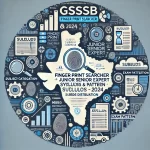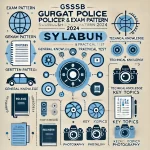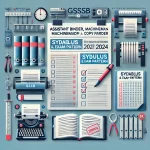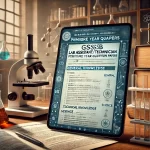Gujarat Subordinate Service Selection Board (GSSSB) conducts exams for the recruitment of Lab Technicians and Lab Assistants in Director’s Office of Judicial Science, Gandhinagar. The GSSSB Lab Technician & Lab Assistant Exam 2024 aims to assess candidate’s technical knowledge, general aptitude and reasoning with other relevant skills.
A detailed and clear understanding of the Gujarat lab assistant and technician syllabus and exam pattern is essential for candidates to perform well in the exam. This post provides a comprehensive guide to the GSSSB Lab Technician & Lab Assistant Syllabus 2024, along with the exam pattern to prepare for its written exam.
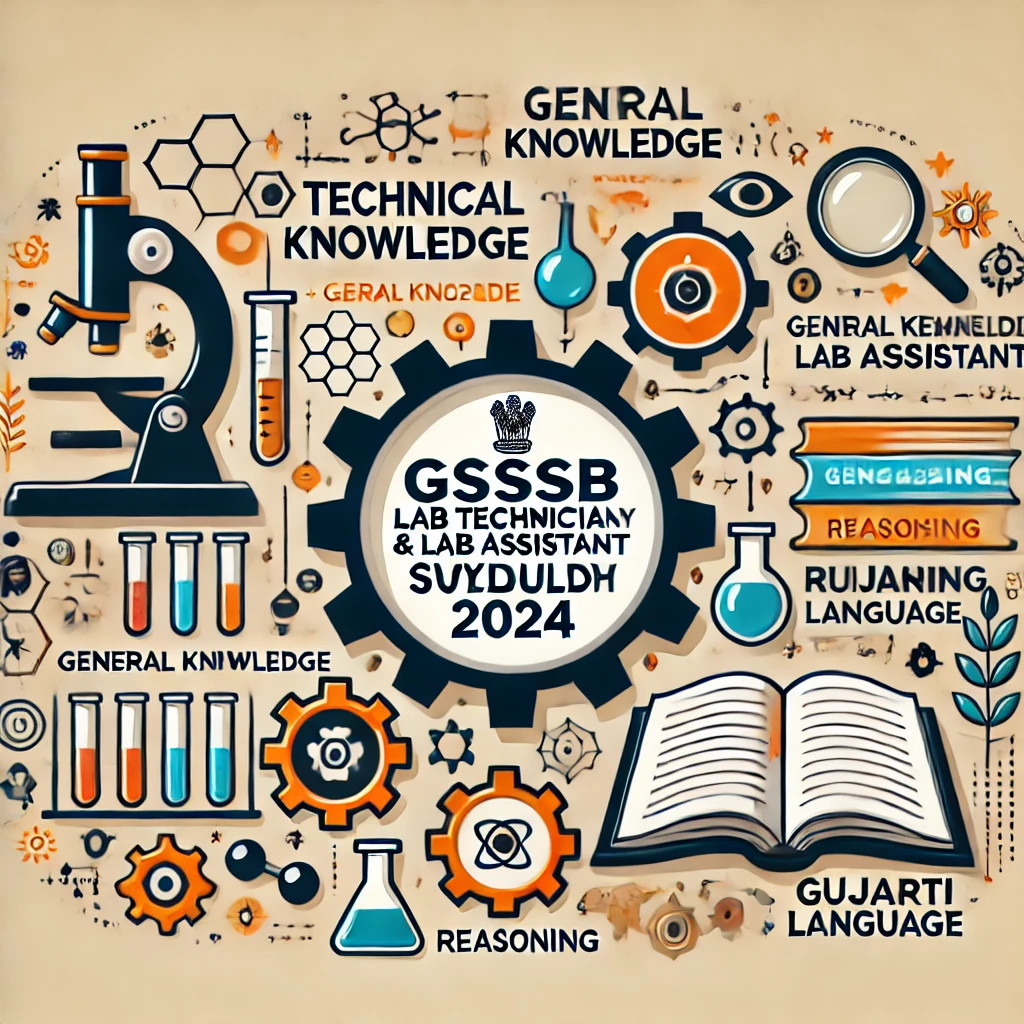
Contents
- 1 GSSSB Lab Technician & Lab Assistant Exam Pattern 2024
- 2 Subject-Wise Marks Distribution:-
- 3 Laboratory Technician/Assistant Chemistry Syllabus
- 4 Laboratory Technician/Assistant Physics Syllabus
- 5 Laboratory Technician/Assistant Biology Syllabus
- 6 Laboratory Technician/Assistant Forensic Psychology Syllabus
- 7 Important Links
- 8 Gujarat Lab Technician & Lab Assistant Syllabus 2024
- 9 Important FAQs
GSSSB Lab Technician & Lab Assistant Exam Pattern 2024
The GSSSB Lab Technician & Lab Assistant Exam is under direct recruitment hence follows a written test followed by a document verification process. The written exam is objective in nature and consists of multiple-choice questions (MCQs).
Key Points about the Lab Asst & Technician Exam Pattern:
- Mode of Exam: Offline (OMR-based)
- Type of Questions: Objective (Multiple Choice Questions)
- Total Marks: 210 marks
- Duration: 180 minutes
- Subjects Covered: Logical Ability and Data Interpretation, Technical Knowledge, General Awareness, Constitution, Numerical Ability and Gujarati & English Language.
- Minimum Qualifying Marks in Part A: 40%
- Minimum Qualifying Marks in Part B: 40%
Subject-Wise Marks Distribution:-
| Part A | Questions | Max Marks |
| Logical Ability and Data Interpretation | 30 | 30 |
| Mathematical Ability | 30 | 30 |
| TOTAL | 60 | 60 |
| Part B | ||
| Questions related to Constitution of India,
Current Affairs, Gujarati and English Comprehension |
30 | 30 |
| Subject Related Topics | 120 | 120 |
| TOTAL | 150 | 150 |
| GRAND TOTAL | 210 | 210 |
| DURATION: 3 Hours (180 Minutes) |
GSSSB Lab Technician & Lab Assistant Syllabus 2024
Reasoning and Data Interpretation (30 Questions, 30 Marks):- This section evaluates logical thinking, pattern recognition, and problem-solving abilities.
- Problems on Ages
- Venn Diagram
- Visual reasoning
- Blood relation
- Arithmetic reasoning
- Data interpretation (charts, graphs, tables)
- Data sufficiency
Mathematical/ Numerical Ability (30 Questions, 30 Marks):- To assess candidate’s knowledge of numerical ability. The topics includes:-
- Number Systems
- Simplification and Algebra
- Arithmetic and Geometric Progression
- Average
- Percentage
- Profit-Loss
- Ratio and Proportion
- Partnership
- Time and Work
- Time, Speed and Distance
- Work, Wages and chain rule
Constitution of India (10 Questions, 10 Marks):-
- Preamble of the Constitution
- Fundamental rights
- Directive principles of state policy
- Fundamental Duty
- Power, role and responsibility of President, vice president and governor
- Parliamentary system
- Amendment of Indian constitution, emergency provisions in Indian constitution
- Centre – State Government and their relation
- Judicial System of Indian Constitution
- Constitutional body
Current Affairs (10 Questions, 10 Marks):- Current events of state, national and international importance
Comprehension (Gujarati {5 marks} & English {5 marks}) (10 Questions, 10 Marks):- To assess comprehension, interpretation and inference skills in both Gujarati and English. A paragraph given with set of question on the basis of paragraph Or statement and assertion type question can be asked.
Questions and its Applications related to Technical Qualification of Laboratory Technician/ Assistant (120 Questions, 120 Marks):-
Laboratory Technician/Assistant Chemistry Syllabus
- Matter, Elements, Atoms, Molecules, Compounds, Mixtures – homogeneous and heterogeneous, Solids, Liquids and Gases.
- Mole concept and applications, Physical change, Chemical change, Boiling point, Freezing point, Evaporation, Condensation.
- General trends of physical and chemical properties of elements in periodic table. Solutions, Colloidal solutions, Suspension.
- Tyndall effect, Brownian motion, Hardy-Schulze rule, Gold number.
- Atomic number, Mass number, Isotope, Isobar, Isotone, Radioactivity, Alpha particle, Beta particle, Gamma ray.
- Chemical bond, Ionic bond, Covalent bond, Coordinate bond, Metallic bond, Hydrogen bond, Vanderwaal’s force.
- Exothermic and Endothermic reactions.
- Redox reaction, Oxidation, Reduction. Acids, Bases, Salts.Source of some common acids.
- Aqua-Regia, pH value, Buffer solution, Bleaching powder, Plaster of Paris.
- Metals and Non metals.
- Laboratory equipment and their handling and basic laboratory techniques like Sample collection, reagent preparation, microscopy, sterilisation, and safety procedures.
Laboratory Technician/Assistant Physics Syllabus
- Units, System of units, dimensions, fundamental units, derived units.
- Scalar quantities, Vector quantities, Distance and Displacement, Speed, Velocity, Acceleration,
- Equations of motion for straight line.
- Projectile motion – Range, Height, Time of flight. Newton’s laws of motion, Inertial frame and Non inertial frame, Pseudo force.
- Friction : Types of friction, Advantages and disadvantages of fiction.
- Circular motion : Angular velocity, Angular acceleration, Angular momentum, torque, Moment of inertia, conservation of energy, conservation of linear momentum, conservation of angular momentum, Centripetal force and Centrifugal force.
- Work, Energy, Power.
- Gravitation : Newton’s law of gravitation, Gravitational force, gravitational potential, gravitational field, motion of satellites, Escape velocity, Kepler’s laws.
- Properties of matter : Elasticity, Stress, strain, Hooke’s law, Young’s modulus, Rigidity modulus, Bulk modulus, Density, Pressure, Pascal’s law, Buoyancy, Archimedes’ principle, Bernoulli’s theorem, Surface tension, Capilarity, Viscocity.
- Periodic motion, Simple Harmonic motion, Simple pendulum, Waves, mechanical wave, longitudinal and transverse waves, Sound waves, speed of sound, echo, doppler effect.
- Heat : Temperature and different scales, Gas laws – Boyle’s law, Charle’s law, Amonton’s law, Avogadro’s law, combined gas law, Specific heat, Heat capacity, Latent heat, Conduction, Convection, Radiation,Newton’s law of cooling, Black body, Kirchoff’s law, Stefan’s law.
- Laboratory equipment and their handling and basic laboratory techniques like Sample collection, reagent preparation, microscopy, sterilisation, and safety procedures.
Laboratory Technician/Assistant Biology Syllabus
- General characteristics of living beings, Cell, Cytology, Types of celss – Prokaryotic cells, Eukaryotic cells, Cell division – Mitosis, Meiosis.
- Functions of cell organelles – Cell wall, mitochondria, Plastids, Chloroplast, Lysosome, Nucleus. Chromosome, Nucleic acids – DNA, RNA and their functions.
- Functions, main sources and deficiency symptoms of Carbohydrates, Proteins, Vitamins, Fats.
- Types of Carbohydrates – Monosaccharides, Oligosaccharides, Polysaccharides. Water and its functions for biological system.
- Differences between animal cell and plant cell.
- Organic evolution, Homologous organs, Vestigial organs.
- Theories of evolution – Lamarckism, Darwinism, Mutation theory.
- Classification of animal into different phylums – Protozoa, Porifera, Coelenterata, Platyhelminthes, Aschelminthes, Annelida, Arthropoda.
- Respiratory systems –Aerobic and Anaerobic, Human respiratory system.
- Circulatory system – Heart, Blood, blood vessels – arteries, veins, capilaries, blood pressure.
- Skeleton – Axial skeleton, Appendicular skeleton system, Excretory system, Urine.
- Nervous system.
- Reproductive system, Endocrine system, endocrine glands, Effects of deficiency and excess of hormones.
- Bacterial, Viral and Protozoan diseases in human.
- Laboratory equipment and their handling and basic laboratory techniques like Sample collection, reagent preparation, microscopy, sterilisation, and safety procedures.
Laboratory Technician/Assistant Forensic Psychology Syllabus
- Unit I Physiological Psychology
- Unit II Systems and Theory of Personality
- Unit III Criminal Psychology
- Unit IV Child Psychology
- Unit V Cognitive Psychology
The above topics are major subjects covered under Psychology. Questions will be asked from subtopics covered under these major subjects.
Note: Syllabus for Laboratory Assistant and Laboratory Technician has not yet announced officially by GSSSB. The syllabus given here is based on previous exam conducted for the same post by other commissions. Once released officially on their official website, it will be updated here.
Important Links
- Must See: GSSSB Lab Assistant/Technician Previous Year Question Papers PDF 2024
- Also See: GSSSB Scientific Assistant/Examiner Previous Year Question Paper PDF 2024
- Must See: GSSSB Scientific Assistant/Assistant Examiner Syllabus & Exam Pattern 2024
- For Latest GSSSB Updates:- https://4syllabus.in/tag/gsssb
- For Latest Government Jobs in Gujarat:- https://4syllabus.in/tag/gujarat/
- Official GSSSB Website:- https://gsssb.gujarat.gov.in
- For Official Lab Assistant/Lab Technical Notification:- CLICK HERE
Gujarat Lab Technician & Lab Assistant Syllabus 2024
The GSSSB Lab Technician & Lab Assistant Exam 2024 is an important opportunity for candidates aspiring to work in the government sector. Understanding of syllabus and the exam pattern will help candidates prepare effectively for lab asst and technician exam.
With diligent preparation, consistent practice, and a clear focus on key topics, candidates can improve their chances of success in the examination. Best of Luck!. Stay with us for more updates.
Important FAQs
Is there a negative marking in the GSSSB Lab Technician & Lab Assistant Exam 2024?
Yes, 1/4 marks for each incorrect answer.
Is the Gujarati and English language section mandatory?
Yes, the Gujarati and English Language & Grammar section is mandatory.
How many marks are allotted to each section?
Check Subject-Wise Marks Distribution table on the page above.
What is the duration of the GSSSB Lab Technician & Lab Assistant Exam 2024?
180 Minutes that is 3 hours.
